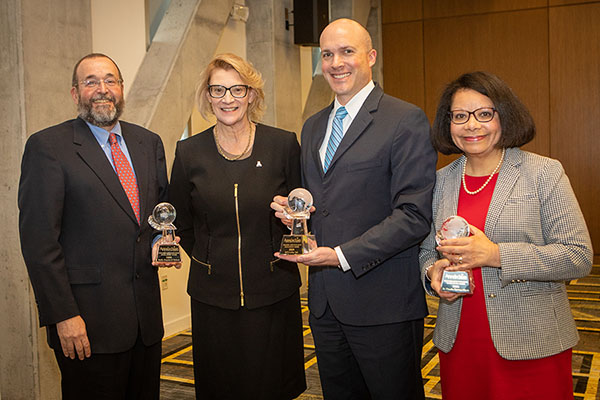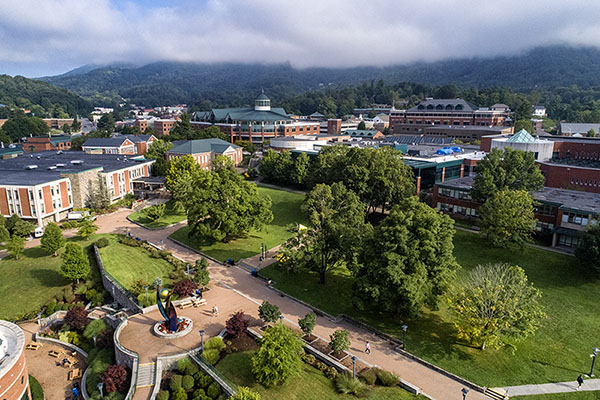BOONE, N.C. — Appalachian State University has been awarded nearly $1 million in grant funding from the National Science Foundation (NSF) to implement ADVANCE APPALACHIAN — a program designed to promote gender equity in STEM fields at App State, with an emphasis on women from underrepresented populations.
Using a framework of inclusive excellence, the ADVANCE APPALACHIAN team — which comprises four College of Arts and Sciences (CAS) faculty and App State’s chief diversity officer — will implement a combination of training, professional development, mentoring and work-life resources for the university’s faculty and staff over the next three academic years (2020–21 to 2022–23).
App State Chancellor Sheri Everts said, “I especially appreciate the ADVANCE APPALACHIAN team’s diligence in pursuing and acquiring this grant. The importance of building equity and inclusion on this campus — across all populations — is critical to the future of our university and society at large.”
The training and work-life resources will be made available for all on-campus faculty and staff, while the professional development opportunities and mentoring provided by the program will be focused toward faculty who are women and underrepresented individuals in STEM (science, technology, engineering and math) fields.
Dr. Jennifer Burris, professor in and chair of the Department of Physics and Astronomy, serves as the principal investigator of the $995,509 grant, which is part of NSF’s ADVANCE program. She said the ADVANCE APPALACHIAN project will expand upon and enhance existing inclusive excellence initiatives at App State.
“While existing programs have produced significant gains in the recruitment and success of underrepresented minority students, they have not yet significantly increased the recruitment and success of women and underrepresented racial and ethnic minority STEM faculty,” she explained. “ADVANCE APPALACHIAN has this goal as a top priority.”
Dr. Willie C. Fleming, App State’s chief diversity officer, has said his goal for inclusive excellence at the university means “all should have access to the excellence this university offers. Every person deserves equitable and fair treatment, a chance and an opportunity to obtain whatever is ‘excellent’ and available to others in our community.”
“Through ADVANCE APPALACHIAN, we will foster a supportive and inclusive academic culture to ensure the success of women and underrepresented faculty in the STEM fields,” said grant co-investigator Dr. Claudia Cartaya-Marin, who is chair of and professor in the A.R. Smith Department of Chemistry and Fermentation Sciences.
According to grant co-investigator Dr. Andrew Bellemer, associate professor in the Department of Biology, the ADVANCE APPALACHIAN team’s research found that the proportion of women in STEM junior faculty positions at App State decreased from 50% in 2016 to below 40% in 2019. He said the grant program “will help to promote systemic change and establish a more diverse STEM community in App State’s future.”
Dr. Brooke Hester, associate professor in the Department of Physics and Astronomy and co-investigator for the grant, said recent COACHE (Collaborative on Academic Careers in Higher Education) and Faculty Senate surveys at App State have indicated a need for more work-life resources, especially in the areas of personal and family policies as well as family care.
“ADVANCE APPALACHIAN recognizes efforts already underway, such as the expansion of the Child Development Center, and will build onto these efforts by founding new programs offering more flexibility and availability of work-life options, and by initiating centralized advocacy for faculty and staff work-life resources,” she said.
Additionally, through the ADVANCE APPALACHIAN project, the university will form a partnership with the North Carolina American Council on Education (ACE) Women’s Network to expand the network of mentors and professional development opportunities for faculty who are women and /or underrepresented in STEM disciplines at App State, Burris said. Burris is an executive board member and treasurer of the organization.
Several university committees — including the Chancellor’s Student Advisory Board for Diversity Recruitment and Retention, the Faculty Recruitment Working Group and the Faculty Diversity and Recruitment Training for Search Committees team — already exist and work to increase recruitment of underrepresented faculty, staff and students at App State.
The university has seen a 97% increase in first-year underrepresented students, nearly doubling that enrollment in Chancellor Everts’ six years at the helm. In the 2020–21 academic year, a record 18% of Appalachian’s total student population is racially/ethnically diverse, and the total underrepresented student population has increased by nearly 56% since 2014. Additionally, in the last five years, the university’s underrepresented staff has more than doubled, increasing from 60 in 2014 to 124 in 2019 and, this year, 32% of new faculty hires are from underrepresented populations.
ADVANCE is part of the NSF’s strategy to broaden participation in the STEM workforce. Since 2001, NSF has invested more than $270 million in ADVANCE projects at more than 100 organizations nationwide, including higher education institutions and STEM-related, not-for-profits.
What do you think?
Share your feedback on this story.
About the Department of Physics and Astronomy
The Department of Physics and Astronomy’s curriculum has an applied nature that includes a core of fundamental physics courses and laboratory experiences. The department prepares graduates for a variety of scientific, teaching or engineering professions, as well as future educational endeavors. Learn more at https://physics.appstate.edu.
About the Department of Biology
The Department of Biology is a community of teacher-scholars, with faculty representing the full breadth of biological specializations — from molecular genetics to landscape/ecosystem ecology. The department seeks to produce graduates with sound scientific knowledge, the skills to create new knowledge, and the excitement and appreciation of scientific discovery. Learn more at https://biology.appstate.edu.
About the A.R. Smith Department of Chemistry and Fermentation Sciences
The A.R. Smith Department of Chemistry and Fermentation Sciences offers a Bachelor of Arts in chemistry, a Bachelor of Science in chemistry with eight different concentrations and an interdisciplinary Bachelor of Science degree in fermentation sciences. The department’s programs prepare students to attend graduate and professional schools, as well as for employment in the pharmaceutical and fermentation industries and other business sectors. Learn more at https://dcfs.appstate.edu.
About the College of Arts and Sciences
The College of Arts and Sciences (CAS) at Appalachian State University is home to 17 academic departments, two centers and one residential college. These units span the humanities and the social, mathematical and natural sciences. CAS aims to develop a distinctive identity built upon our university's strengths, traditions and locations. The college’s values lie not only in service to the university and local community, but through inspiring, training, educating and sustaining the development of its students as global citizens. More than 6,800 student majors are enrolled in the college. As the college is also largely responsible for implementing App State’s general education curriculum, it is heavily involved in the education of all students at the university, including those pursuing majors in other colleges. Learn more at https://cas.appstate.edu.
About Appalachian State University
As a premier public institution, Appalachian State University prepares students to lead purposeful lives. App State is one of 17 campuses in the University of North Carolina System, with a national reputation for innovative teaching and opening access to a high-quality, cost-effective education. The university enrolls more than 21,000 students, has a low student-to-faculty ratio and offers more than 150 undergraduate and 80 graduate majors at its Boone and Hickory campuses and through App State Online. Learn more at https://www.appstate.edu.







![How NCInnovation Is Rethinking Economic Development in North Carolina [faculty featured]](/_images/_posts/2026/02/rethinking-economic-development-600x400.jpg)






